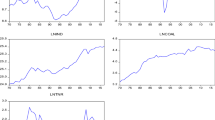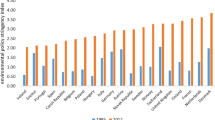Abstract
A close association prevails among energy consumption, energy prices, and income levels. This association has implications for the growth of an economy. Hence, incorporating energy consumption properties in an economy is crucial for policy design purposes especially in the case of energy-exporting countries of the Gulf Cooperation Council (GCC). This paper studies the correlates of energy consumption with an emphasis on shocks in crude oil prices, changes in GDP per capita, carbon dioxide emissions, trade, population growth, and other key indicators using a panel of GCC countries over 30 years of data period (1985–2014). The study provides direct evidence of the oil price shocks and energy consumption using a static panel (POLS and FE) and dynamic panel (system-GMM) estimation technique. The finding shows that oil price shocks affect energy consumption negatively. The greatest positive effect on energy consumption is observed with an increase in GDP per capita, as a percent increase in it increases energy consumption by 0.65 percent. It is followed by trade openness which increases energy consumption by 0.14 percent. While the greatest negative effect on energy consumption is observed by a rise in oil prices, as a percent increase in oil prices reduces energy consumption by approximately 0.22 percent. The study also finds that higher energy consumption increases carbon dioxide emissions as energy consumption is growing with population growth. Thus, it is important to upscale the adoption of renewable energy sources, adopt energy-efficient technologies, reduce energy subsidies, and practice demand-side management.

Source Author's

Source Author's

Source Author's

Source Author's
Similar content being viewed by others
References
Alarenan, S., Gasim, A. A., & Hunt, L. C. (2019). Measuring underlying energy efficiency in the GCC countries using a newly constructed dataset. Energy Transitions, 3, 31–44.
Al-Badi, A., & Al-Mubarak, I. (2019). Growing energy demand in the GCC countries. Arab Journal of Basic and Applied Sciences, 26(1), 488–496.
Al-Iriani, M. A. (2006). Energy–GDP relationship revisited: an example from GCC countries using panel causality. Energy Policy, 34(17), 3342–3350.
Anderson, T. W., & Hsiao, C. (1981). Estimation of dynamic models with error components. Journal of the American Statistical Association, 76(375), 598–606.
Andrews, D. W. (2005). Cross-section regression with common shocks. Econometrica, 73(5), 1551–1585.
Apergis, N., & Payne, J. E. (2011). The renewable energy consumption–growth nexus in Central America. Applied Energy, 88(1), 343–347.
Arellano, M., & Bond, S. (1991). Some tests of specification for panel data: Monte Carlo evidence and an application to employment equations. The Review of Economic Studies, 58(2), 277–297.
Arellan, M., & Bover, O. (1995). Another look at the instrumental variable estimation of error components models. Journal of Econometrics, 68(1), 29–51.
Blundell, R., & Bond, S. (1998). Initial conditions and moment restrictions in dynamic panel data models. Journal of Econometrics, 87(1), 115–143.
Caner, M., & Hansen, B. E. (2004). Instrumental variable estimation of a threshold model. Econometric Theory, 20(5), 813–843.
Caporale, G. M., Gil-Alana, L. A., Monge, M. (2019). Energy consumption in the GCC countries: Evidence on persistence. CESifo working paper series 7470, CESifo Group Munich.
Çoban, S., & Topcu, M. (2013). The nexus between financial development and energy consumption in the EU: A dynamic panel data analysis. Energy Economics, 39, 81–88.
Dedeoğlu, D., & Kaya, H. (2013). Energy use exports imports and GDP: New evidence from the OECD countries. Energy Policy, 57, 469–476.
Dudley, B. (2018). BP statistical review of world energy. BP Statistical Review London UK. Accessed Aug 6 2018
Gasimli, O., Haq, I., Naradda, G. S. K., Shihadeh, F., Rajapakshe, P. S. K., & Shafiq, M. (2019). Energy trade urbanization and environmental degradation nexus in Sri Lanka: Bounds testing approach. Energies, 12, 1655.
Ghalayini, L. (2011). The interaction between oil price and economic growth. Middle Eastern Finance and Economics, 13, 127–141.
Gil-Alana, L. A., Loomis, D., & Payne, J. E. (2010). Does energy consumption by the US electric power sector exhibit long memory behavior. Energy Policy, 38(11), 7512–7518.
Hamilton, J. D. (1983). Oil and the macroeconomy since World War II. Journal of Political Economy, 91(2), 228–248.
Hamilton, J. D. (2003). What is an oil shock? Journal of Econometrics, 113(2), 363–398.
Hamilton J D (2009) Causes and consequences of the oil shock of 2007–08. Working paper No. w15002. National Bureau of Economic Research.
Hansen, B. E. (1999). Threshold effects in non-dynamic panels: Estimation, testing, and inference. Journal of Econometrics, 93(2), 345–368.
Hansen, L. P. (1982). Large sample properties of generalized method of moments estimators. Econometrica: Journal of the Econometric Society, 50(4), 1029–1054.
Haque, M. I. (2019). The economic and energy efficiencies of GCC states: A DEA approach. Management Science Letters, 9, 1–12.
Haque, M. I., & Khan, M. R. (2019). Role of oil production and government expenditure in improving human development index: Evidence from Saudi Arabia. International Journal of Energy Economics and Policy, 9(2), 251.
Howarth, N., Galeotti, M., Lanza, A., & Dubey, K. (2017). Economic development and energy consumption in the GCC: An international sectoral analysis. Energy Transitions, 1(2), 6.
Huda, M. S. (2020). Energy cooperation in South Asia: Utilizing natural resources for peace and sustainable development. Abingdon: Routledge.
Huda, M. S., & McDonald, M. (2016). Regional cooperation on energy in South Asia: Unraveling the political challenges in implementing transnational pipelines and electricity grids. Energy Policy, 98, 73–83.
IEA (2019) World energy outlook 2019. IEA Paris. https://wwwieaorg/reports/world-energy-outlook-2019
IRENA. (2019). Renewable energy market analysis: GCC 2019. Abu Dhabi: International Renewable Energy Agency. ISBN: 978-92-9260-096-9.
Khan, M. R., & Haque, M. I. (2019). Oil development and military expenditure: A panel data evidence from the Middle East. Journal of Security Sustainability Issues, 8(4), 549–568.
Krane, J. (2015). Stability versus sustainability: Energy policy in the Gulf monarchies. The Energy Journal, 36(4), 1–21.
Kriskkumar, K., & Naseem, N. A. M. (2019). Analysis of oil price effect on economic growth of ASEAN net oil exporters. Energies, 12, 3343.
Lardic, S., & Mignon, V. (2008). Oil prices and economic activity: An asymmetric cointegration approach. Energy Economics, 30(3), 847–855.
Le, T. H. (2016). Dynamics between energy output openness and financial development in sub-Saharan African countries. Applied Economics, 48(10), 914–933.
Mahmood, H., & Furqan, M. (2020). Oil rents and greenhouse gas emissions: Spatial analysis of Gulf Cooperation Council countries. Environment, Development and Sustainability, 1-19.
Mbarek, M. B., Ali, N. B., & Feki, R. (2014). Causality relationship between CO2 emissions, GDP and energy intensity in Tunisia. Environment, Development and Sustainability, 16(6), 1253–1262.
Mehrara, M. (2007). Energy consumption and economic growth: The case of oil exporting countries. Energy policy, 35(5), 2939–3294.
Mohammadi, H., & Parvaresh, S. (2014). Energy consumption and output: Evidence from a panel of 14 oil-exporting countries. Energy Economics, 41, 41–46.
Mory, J. F. (1993). Oil prices and economic activity: is the relationship symmetric? The Energy Journal, 14(4), 151–161.
Narayan, P. K., & Smyth, R. (2009). Multivariate Granger causality between electricity consumption exports and GDP: Evidence from a panel of Middle Eastern countries. Energy Policy, 37(1), 229–236.
Nasreen, S., & Anwar, S. (2014). Causal relationship between trade openness economic growth and energy consumption: A panel data analysis of Asian countries. Energy Policy, 69, 82–91.
Omri, A. (2013). CO2 emissions energy consumption and economic growth nexus in MENA countries: Evidence from simultaneous equations models. Energy Economics, 40, 657–664.
Omri, A., Daly, S., & Nguyen, D. K. (2015). A robust analysis of the relationship between renewable energy consumption and its main drivers. Applied Economics, 47(28), 2913–2923.
Omri, A., Daly, S., Rault, C., & Chaibi, A. (2015). Financial development environmental quality trade and economic growth: What causes what in MENA countries. Energy Economics, 48, 242–252.
Osman, M., Gachino, G., & Hoque, A. (2016). Electricity consumption and economic growth in the GCC countries: Panel data analysis. Energy Policy, 98, 318–327.
Ozturk, I., Aslan, A., & Kalyoncu, H. (2010). Energy consumption and economic growth relationship: Evidence from panel data for low and middle income countries. Energy Policy, 38(8), 4422–4428.
. Peng, Z., & Wu, Q. (2019). Evaluation of the relationship between energy consumption, economic growth, and CO2 emissions in China transport sector: The FMOLS and VECM approaches. Environment Development and Sustainability, 1–25.
Sadorsky, P. (2011). Trade and energy consumption in the Middle East. Energy Economics, 33(5), 739–749.
Sadorsky, P. (2012). Energy consumption output and trade in South America. Energy Economics, 34(2), 476–488.
Sargan, J. D. (1958). The estimation of economic relationships using instrumental variables. Econometrica: Journal of the Econometric Society, 26, 393–415.
Shahbaz, M., Lahiani, A., Abosedra, S., & Hammoudeh, S. (2018). The role of globalization in energy consumption: a quantile cointegrating regression approach. Energy Economics, 71, 161–170.
Shahbaz, M., Nasreen, S., Ling, C. H., & Sbia, R. (2014). Causality between trade openness and energy consumption: What causes what in high middle and low income countries. Energy Policy, 70, 126–143.
Taghizadeh-Hesary, F., Yoshino, N., Rasoulinezhad, E., & Chang, Y. (2019). Trade linkages and transmission of oil price fluctuations. Energy Policy, 133, 110872.
Vohra, R. (2017). The impact of oil prices on GCC economies. International Journal of Business and Social Science, 8(2), 7–14.
Xue, B., Geng, Y., Müller, K., Lu, C., & Ren, W. (2014). Understanding the causality between carbon dioxide emission fossil energy consumption and economic growth in developed countries: an empirical study. Sustainability, 6, 1037–1045.
Author information
Authors and Affiliations
Corresponding author
Ethics declarations
Conflict of interest
The author reports no conflict of interest.
Additional information
Publisher's Note
Springer Nature remains neutral with regard to jurisdictional claims in published maps and institutional affiliations.
Rights and permissions
About this article
Cite this article
Haque, M.I. Oil price shocks and energy consumption in GCC countries: a system-GMM approach. Environ Dev Sustain 23, 9336–9351 (2021). https://doi.org/10.1007/s10668-020-01027-y
Received:
Accepted:
Published:
Issue Date:
DOI: https://doi.org/10.1007/s10668-020-01027-y




